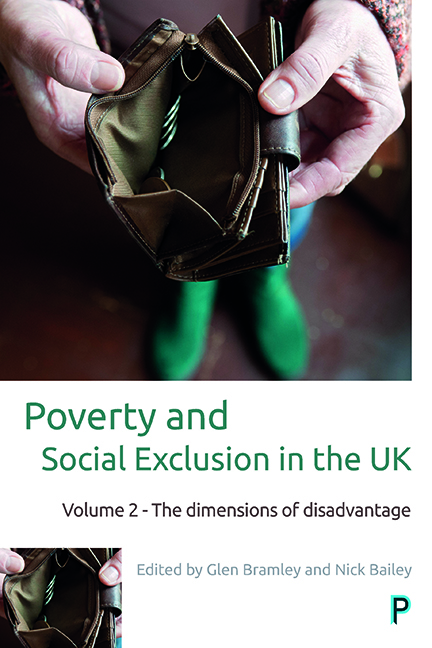five - Social participation and social support
Published online by Cambridge University Press: 12 April 2022
Summary
Introduction
The ability to maintain social relationships and networks, and to participate in widely enjoyed social activities, is as central to Townsend's conception of relative poverty as it is to definitions of social exclusion (Townsend, 1979; Levitas, 2006; Levitas et al, 2007). These relationships and activities matter because they form part of the ‘customary norms’ or expectations of us as members of our society. In this sense, they are an end in themselves. At the same time, social networks and activities can be a means to other ends. Our social networks can offer access to support when we need it, both emotional and practical. Supportive social contacts can in turn have important positive impacts on physical and mental health and on well-being. Social networks can provide access to information, particularly about employment opportunities, helping us to get on as well as get by. People living on low incomes can find these networks invaluable but they can equally find them to be a source of onerous demands on already stretched resources.
Many factors can act as barriers to social participation and lead to people becoming socially isolated or excluded. Low income is a key barrier to the maintenance of social networks and participation in social activities. The inability to afford to participate in a range of widely practised and valued social activities forms part of the core deprivation measure in the PSE-UK study for this reason. Other barriers include personal factors such as ill health and disability, or time pressures arising from paid work or unpaid caring responsibilities. The overall aim of this chapter is to explore how social contact and participation varies in relation to a wide range of factors, with a particular focus on poverty and material constraint in restricting participation. We exploit the wide range of measures of participation available within the PSE-UK survey, including measures of social contact with family and with friends, perceptions of social support, satisfaction with personal relationships, and participation in common social activities.
The importance of social connections
Household resources have a direct impact on social networks and activities. Indeed, in Townsend's (1993) conception of relative poverty, participation in customary social activities and the maintenance of social networks are seen as basic expectations of members of a society so that the inability to afford to do so is a marker or defining feature of poverty.
- Type
- Chapter
- Information
- Poverty and Social Exclusion in the UK Vol 2The dimensions of disadvantage, pp. 137 - 158Publisher: Bristol University PressPrint publication year: 2017

